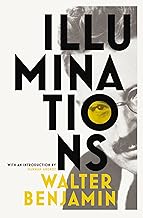Illuminations: Essays and Reflections by Walter Benjamin 1968
In the spirit of full disclosure, I will admit to not having finished this book. That makes it a first among the 3154 books in www.EpsteinReads.com. I ordinarily would not have entered this book into the web site, but having read the preface by Leon Wieseltier and the excellent introduction by Hannah Arendt as well as the first three essays in the book, I thought it warranted bringing it to your attention. Plus, I found Benjamin, at least in this translation, to be heavy going and I was quite certain I would not be able to finish the rest of the book. So….
Who was Walter Benjamin and why did he play such an outsized role in literary criticism in the late 20th and early 21st C. First, he was a leading member of the Frankfurt School which included Theodore Adorno, Herbert Marcuse, and Erich Fromm. Their philosophical approach focused on criticism of the impact of technology and capitalism on society. Benjamin’s best known work was the ‘The Work of Art in the Age of Mechanical Reproduction’, a critique of the loss of the aura of the art object when the original was not viewed live because so many reproductions were available. Second, Benjamin wrote staggering volumes of articles, essays, books and technical papers. At the time of his death, he had been working on his major opus for 13 years. ‘The Arcades Project’ was a book about city life in Paris and the flaneur who walks through the city observing. Third, Benjamin was a high profile Jewish intellectual who fled Germany and then fled France only to die at the Spanish border when it was closed to Jews the day before he arrived.
I read the first three essays in this book, perhaps his best known works. ‘Unpacking My Library’ is a classic examination of the psyche of the collector, driven more by the chase than by the object. ‘The Task of the Translator’ and ‘The Storyteller’ are more complex works examining the relationships between different languages and the loss of storytelling as the means of communication of experience. As Arendt observes, Benjamin’s goal was to observe closely those elements of everyday life that have become invisible and to reveal the secret meanings of those things. Metaphor, aphorism, and quotations were the tools he used as he sought in his own words to be regarded as “the foremost critic of German literature.”
At one point early in this century, Benjamin’s presence was so pervasive that in her 2012 book ‘Artful’ Ali Smith describes an academic conference where her characters play ‘Walter Benjamin bingo’ noting on a bingo card every time a speaker mentions Benjamin’s name. This book is a good introduction to Benjamin’s writing and philosophy. It’s not easy going, but if you’re interested in collecting, translating, storytelling, Proust, or Kafka, there are nuggets of gold to be mined in these pages.



